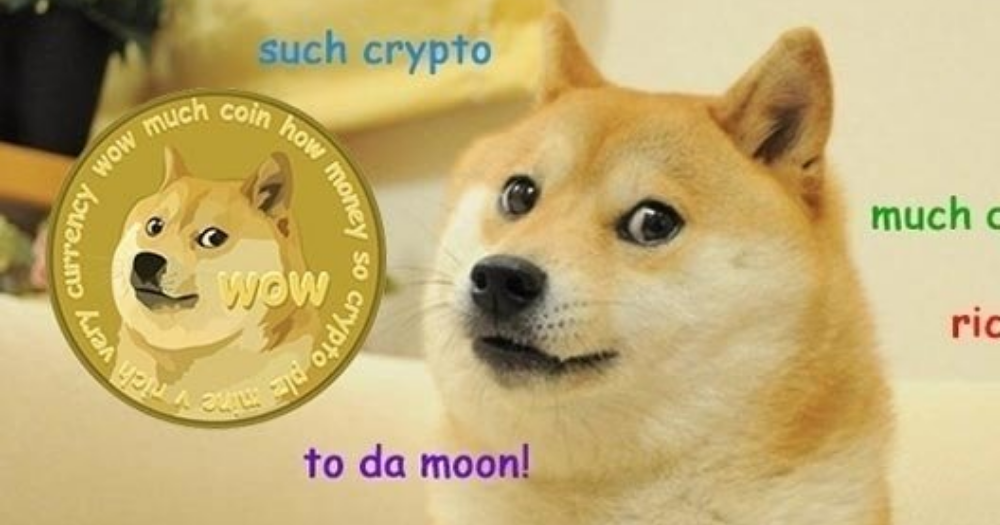I am someone who considers myself quite diligent with money.
I worked part-time, budgeted, and put away savings all throughout university, and I absolutely love finding good deals.
However, when it comes to longer-term money things, I’m a lot more blur.
I’ve heard of all the classic financial jargon — stocks, bonds, mutual funds.
However, unlike my colleague, who said "Blockchain is the future" while we were chatting about cryptocurrency, I’ve always felt more sceptical about crypto.
After all, it’s something I feel like I’ve only heard about in passing, and it has always seemed confusing and a little sketchy.
Learning some background
Luckily for me, I came across Coinhako, one of a number of local companies working to make cryptocurrencies more accessible to us here in Singapore and in Asia in general.
Like others who do this as well, Coinhako is a digital assets wallet service that aims to make buying and trading cryptocurrency easy and secure.
To tackle my noob questions and concerns about cryptocurrencies, the team at Coinhako invited me for an introductory crash course in their office, where I met up with their co-founder, Yusho Liu.
To get started, what even is it??
A cryptocurrency, Liu explained, is a form of digital money that first appeared in the form of Bitcoin in 2008.
"While you can transfer your traditional money like Singapore Dollars (SGD) digitally, the technology behind cryptocurrencies, such as blockchain technology which enables Bitcoin, is what makes them different", Liu explained.
And is Blockchain safe and secure? Liu said that while the continuously-evolving nature of the technology means newer concepts have a high chance of being in legal grey areas, regulatory frameworks are being created.
For example, the Monetary Authority of Singapore (MAS) has established its first regulatory framework to govern cryptocurrency services — the Payment Services Act, which came into effect on Jan. 28 this year.
"Companies in the Singaporean cryptocurrency space have been anticipating the release of a license for years now," Liu explains.
Before the regulation of companies like Coinhako came under the purview of the MAS, the industry was largely a grey area. This led to many obstacles for local companies in dealing with the technology.
The Act would help further legitimise these businesses and give local cryptocurrency goers a better sense of security. More information about what to know about the Payment Services Act is available in this handy blog post.
Centralised platforms like Coinhako ensure the security and seamlessness of transacting cryptocurrency.
Setting up an account
Feeling a little more confident and a lot more curious about how exactly one gets into cryptocurrencies, I decided to give it a try.
Setting up an account with Coinhako was simple enough:
Step 1: Download the app.
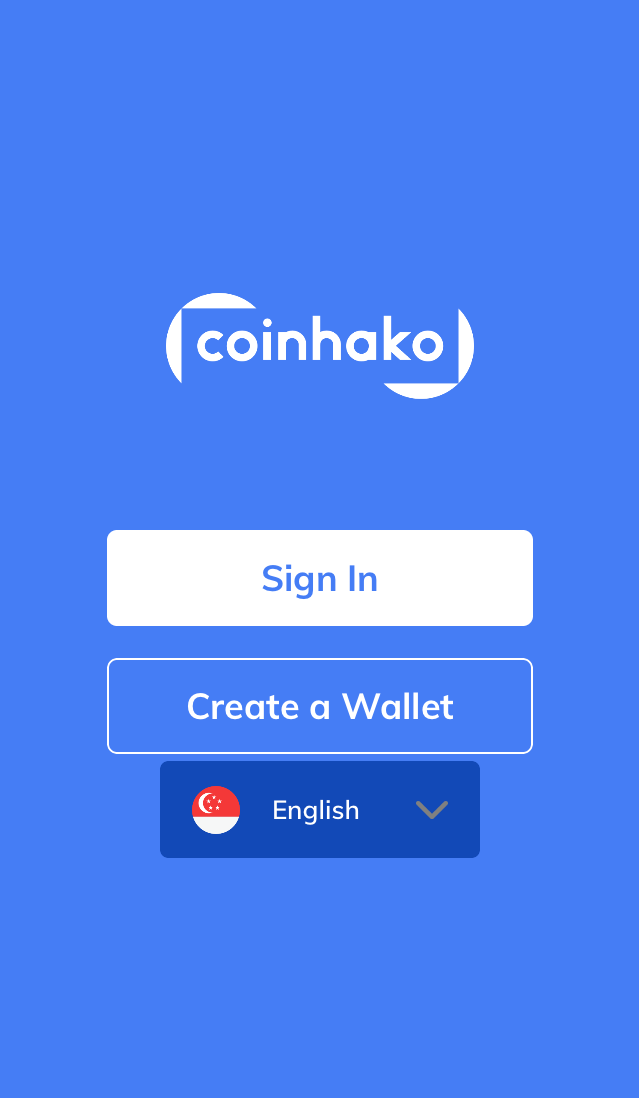
Step 2: Verify that I’m a real person.
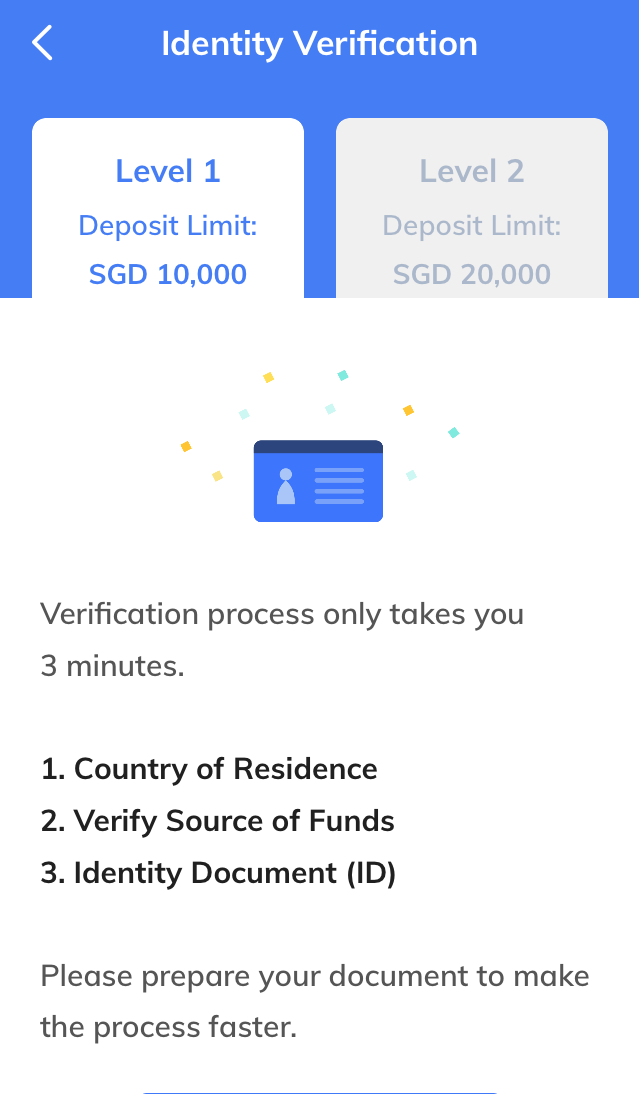
Coinhako is currently available for users based in Singapore, Vietnam, and Indonesia. Users must be either citizens of or hold valid resident passes or visas in one of the four countries.
For "source of funds", I just have to select where the money I’m using to purchase cryptocurrency on the app is coming from.
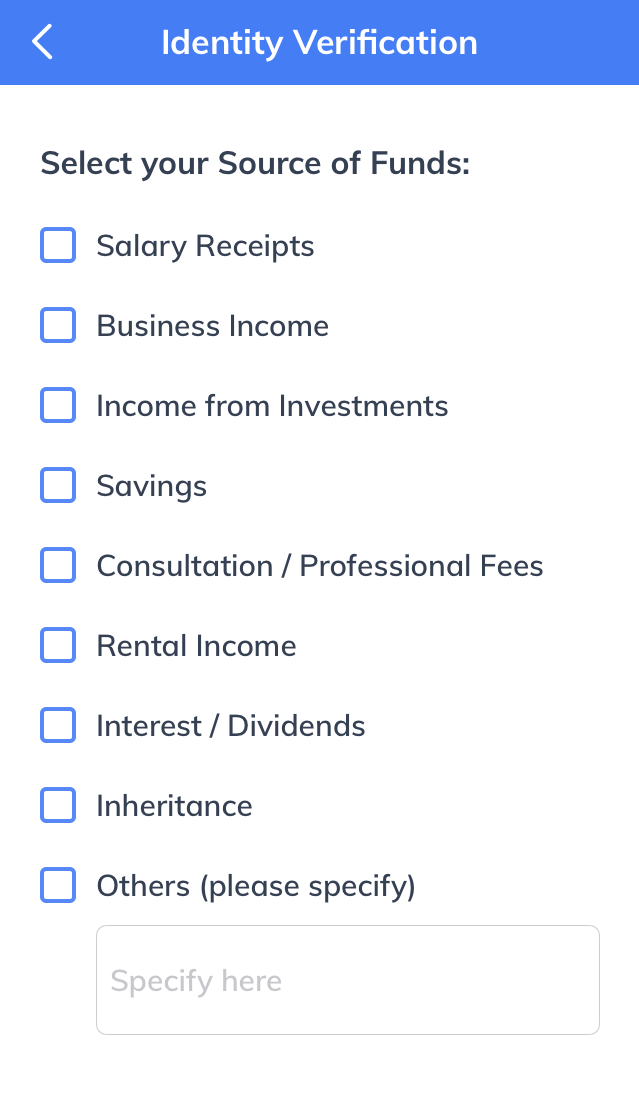
(Inheritance? I wish. I chose "Savings".)
Then, I was asked to take photographs of the front and back of a valid identity document. Some examples of IDs Coinhako accepts includes NRIC, FIN, Singaporean passport, and any government service card.
Verification is done manually by the Coinhako team, and usually takes less than one business day.
And with that, I was ready to buy my first bitcoin!
Getting started with crypto
This is what the basic homepage looks like when I had no money (what’s new?) to buy cryptocurrency yet:

I had been a little nervous that cryptocurrencies would be out of reach for me and my millennial lack of capital, as I had always been under the impression that purchasing cryptocurrencies was only for the rich.
How could I, a mere commoner, possibly get started with trading cryptocurrency? How much did I need to begin with, as a minimum?
But, Liu assured me, "The beauty of digital assets is that you can cut it up into fractions and buy it up in decimals."
And on Coinhako’s platform, I would be able to purchase my batch of Bitcoin for as little as S$30.
So we loaded up my Coinhako wallet with a princely S$100 (enough to purchase three different cryptocurrencies!) and I got started with buying.
I decided to get Bitcoin (because I’m basic), Ethereum (because it sounds cool and is one of the more popular cryptocurrencies), and Dogecoin (because memes).
And then it was time for the waiting game.
Cool features
One of the aspects of the app I enjoyed a lot was the daily points reward for logging in:
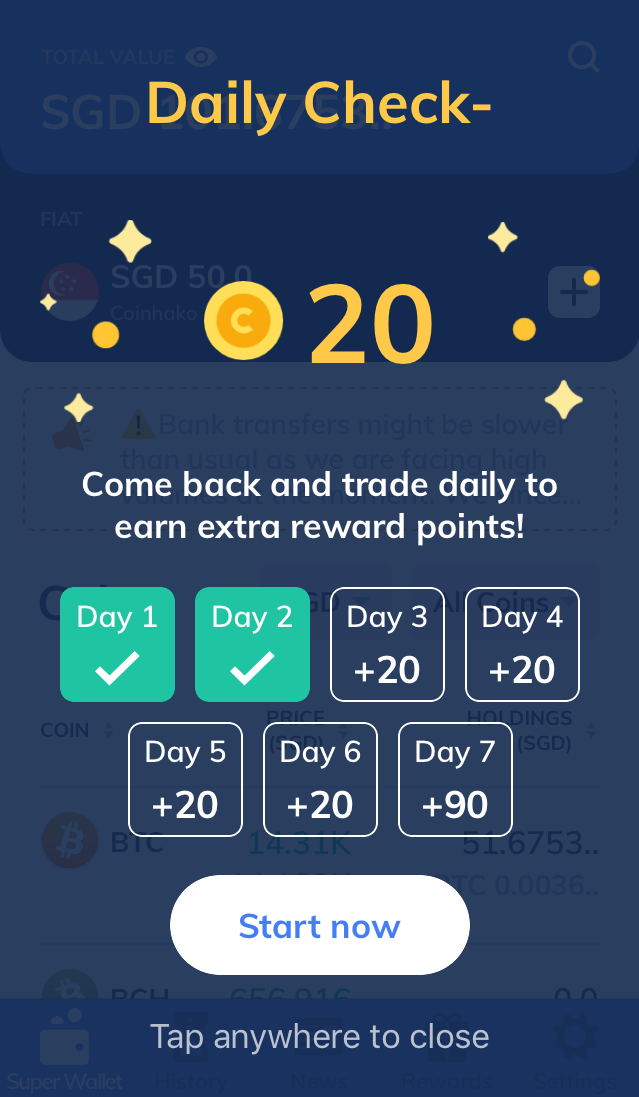
For someone whose regularly-used apps are limited to Instagram, Telegram, WhatsApp, Facebook, TikTok (yes, I am very ~in with the times~), and Netflix, remembering to check on my cryptocurrencies would have been a struggle, had it not been for the reward.
I found that every consecutive day I logged into the app, the more dopamine I perceived coursing through my veins as I was awarded more and more "coins".
And the best thing about these virtual coins is that they are more than just a mood booster — they can actually be exchanged for rewards.
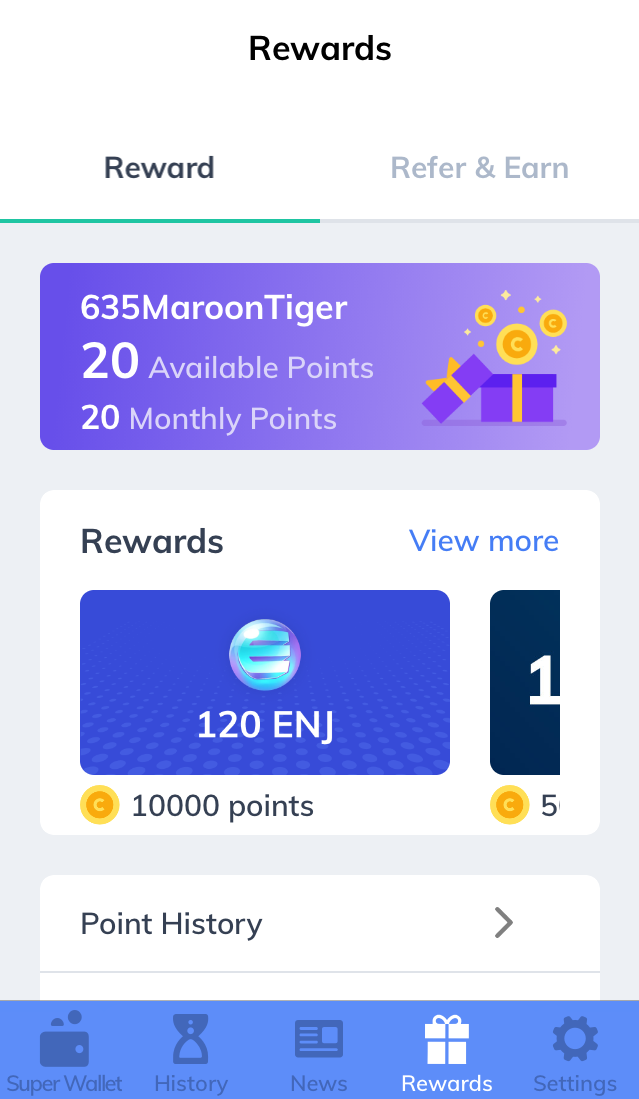
And what are these rewards, you might ask?
They can be vouchers to be exchanged for actual cryptocurrencies, or discount codes for a percentage off of the platform’s fees for buying, selling, or swapping trades.
For two weeks in a row, I successfully hit Day 6, much to my pride, before tragically forgetting to check the app on Sunday and missing out on the bonus coins.
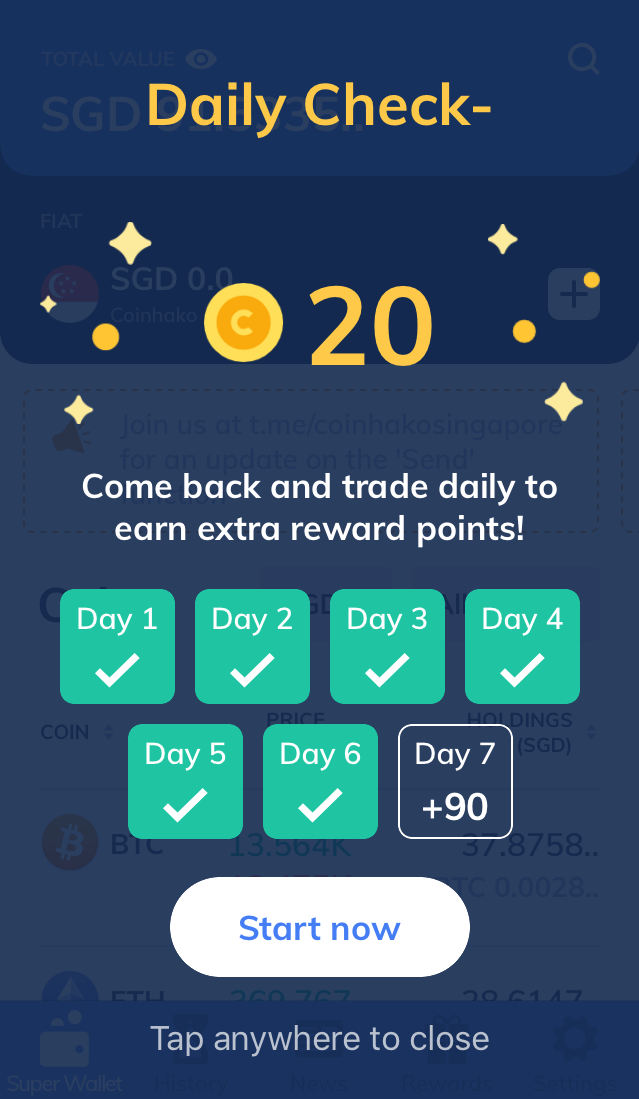
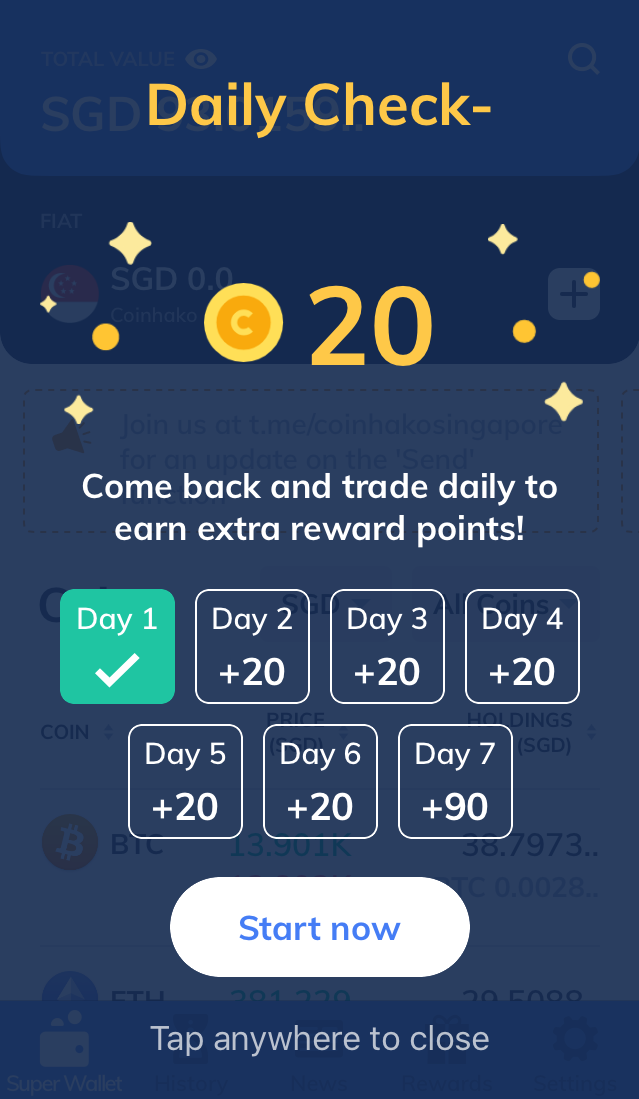
Another great feature on the app is the news tab, where you can catch up on the latest cryptocurrency-related news.

For me, it was just helpful to be able to scroll through and read articles that I would normally have ignored had they been shared by my Facebook friends, to slowly learn more about the industry.
Using cryptocurrency to buy things
After a couple weeks of trying my hand at buying and holding onto Bitcoin, Ethereum, and of course, my favourite — Dogecoin — I was ready to journey into the real world and buy real-life things with cryptocurrencies.
Although using cryptocurrencies as payment is nowhere close to as common as other methods, such as cash, NETS, or PayLah!, there are some businesses that do accept it.
One of these is Ducatus Cafe, located near Tanjong Pagar.
 Photo by Jane Zhang.
Photo by Jane Zhang.
I decided to opt for a smoothie and a fruit juice, totalling to S$11.80, or 0.00123786 Bitcoin. (Unfortunately, Dogecoin isn’t as commonly-accepted a currency, but then again, more for me to keep!)
Here’s a picture of my drinks sitting in front of me as I basked in the satisfaction of having used cryptocurrency to buy something for the first time:
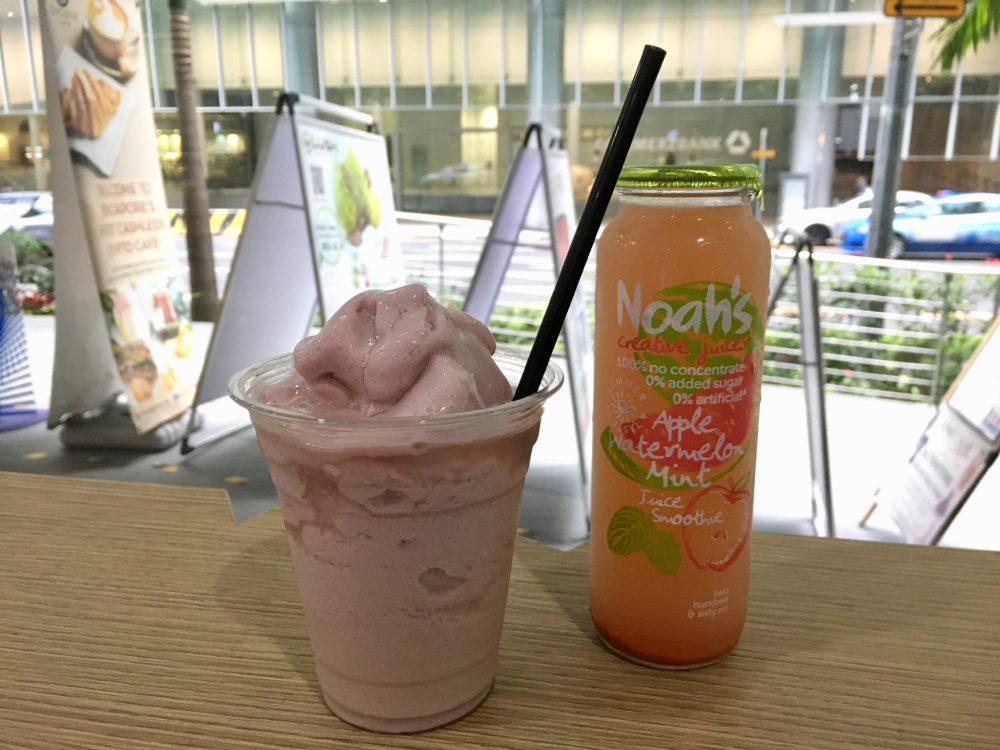 Photo by Jane Zhang.
Photo by Jane Zhang.
In addition to being able to buy snazzy drinks at cafes, being knowledgeable about how to use cryptocurrencies can have other cool advantages.
For example, if I were to buy something off of my Amazon wishlist using crypto on Purse.io, I would also get a sweet discount.
I can even use cryptocurrencies to donate money to important causes, such as The Water Project, a non-profit organisation that works with communities in sub-Saharan Africa to create access to clean, safe water.
It is one of the first charities to accept donations in Bitcoin, and donating with Bitcoin simplifies the process thanks to the ease of cross-border donations that cryptocurrencies allows for.
How do I feel about crypto now?
So now, after a few weeks of officially owning cryptocurrencies, I reflect on my experience.
Am I still confused about what goes on behind the screen and inside the network of blockchain? Yes.
But am I glad I tried it out in a very painless and helpful way? Also yes.
While I may not be all about that blockchain life now, I can see how buying and selling smartly can add to my repertoire.
And, as Liu points out to me, “Singapore’s ongoing push for the Payment Services Act to regulate the local cryptocurrency space, brings a lot of optimism to the outlook of the market. With this, I would not even be surprised if we see banks with cryptocurrency offerings for customers, going forward.”
Understanding cryptocurrencies is particularly important here, given that Singapore has grown to be known as one the world’s key cryptocurrency and blockchain destinations.
If you’re a newbie to cryptocurrencies like me, Coinhako is a great place to start! (I’d recommend starting with Dogecoin, solely because it’s cute).
Oh, and some good news: I finally remembered to hit Day 7, after multiple weeks of trying!
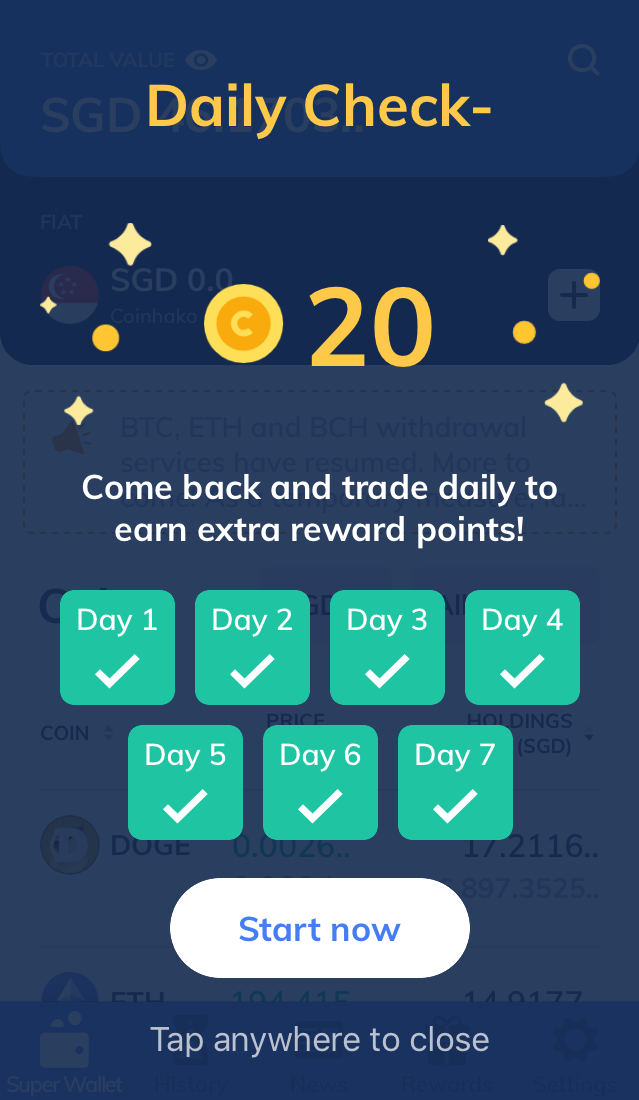
This sponsored article brought to you by Coinhako made this author rethink how money-savvy she really is.
Top image via change.org.
If you like what you read, follow us on Facebook, Instagram, Twitter and Telegram to get the latest updates.
